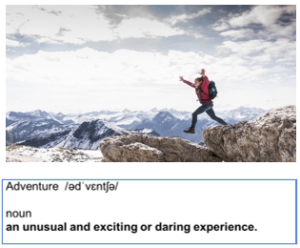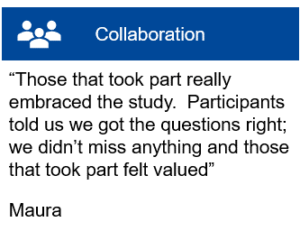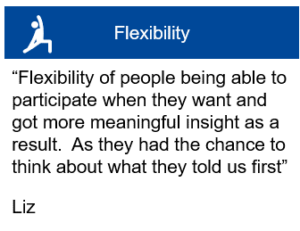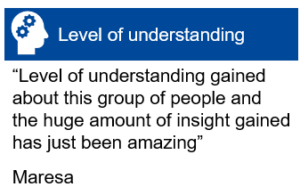
Three intrepid researchers deliver ECC’s first in-house digital ethnography
It’s been a daring adventure and a leap of faith for us to combine an online tool (Incling) with research skills, for a project about mental health support.
What's digital ethnography?
It’s a research method that uses an online platform to capture people’s views and experience e.g., videos, diary entries, pictures, and journeys, to gain a better understanding of particular social or cultural groups.
It’s a little like posting on Facebook but in response to questions and tasks and only the admins can see the responses – at least that’s how we set it up for this project, but it can be used collaboratively too.
The best things about this project were the collaboration, the flexibility it gave participants and the depth of insight that we gained about mental health support.
Continuous collaboration

So why was this so different? This was not our usual 1-hour interview. This was almost being virtually part of someone’s life for two weeks and yes it was hard to switch off, but worth it.
It started with an initial interview to see if participants were keen to do the research, use the online tool and see if their family were interested in taking part too. We designed different tasks and questions in a paced way to keep the energy and commitment going.
During those two weeks of the project, we built trusting relationships with our participants, encouraging them to complete the different online tasks sharing valuable insights with us.
Working with this vulnerable group was always going to be a bit of an unknown and the team needed to prepare for the unexpected, which of course we did. We needed to ensure the wellbeing of our participants through the life of the project. Safeguarding processes were put into place and we regularly checked in with our participants seven days a week, responding and monitoring posts.
Great flexibility

Time wasn’t a barrier. People had full control over when and what they told us. We even received posts at 4am sharing what they were thinking or feeling.
This flexibility allowed people the space and thinking time to answer our questions – which enabled them to tell us the important things and gather more than we would have from just an interview.
Also, people had the option to share posts in a format that suited them, for example, some preferred writing their thoughts in a diary entry, whilst others liked sharing photos and videos. For us researchers, this was a really creative way to capture great insight!
Considerable depth of insight

What was exciting but a little overwhelming was the huge amount of insight that we gained from our participants over the two weeks and the follow-up interview. No other method has given us so much insight. The tools in Incling allowed us to theme the important things that people said and download diary entries, tasks, text, videos and pictures.
It took two weeks to do, with over 1000 pieces of insight themed but it was also great to be reminded what people told us! We held several analysis sessions over two weeks to talk about the themes and the evidence we had to create our storyboard.
The challenge has been how can we take such rich insight and represent our participants and their words fairly, in a really condensed way that is still creative and as impactful for the stakeholders who will read the report as it was for us researchers to receive it. We asked our wider colleagues to create audios for us using the words of the participants, and illustrative case studies to bring stories to life – so we think we have cracked it.
A great adventure for participants and researchers
The feedback we gained from our brilliant participants has been very positive, with some receiving benefits from journaling and thinking about their current mental health support.
For us researchers, it’s been a huge eye-opener in terms of the possibilities for ECC’s Research and Citizen Insight team and our future research. It’s also been a great learning experience. It is a method that needs the right project, but a method we’re keen on using again soon!
If you would like to find out more information or have any questions, please contact research@essex.gov.uk.

Leave a comment